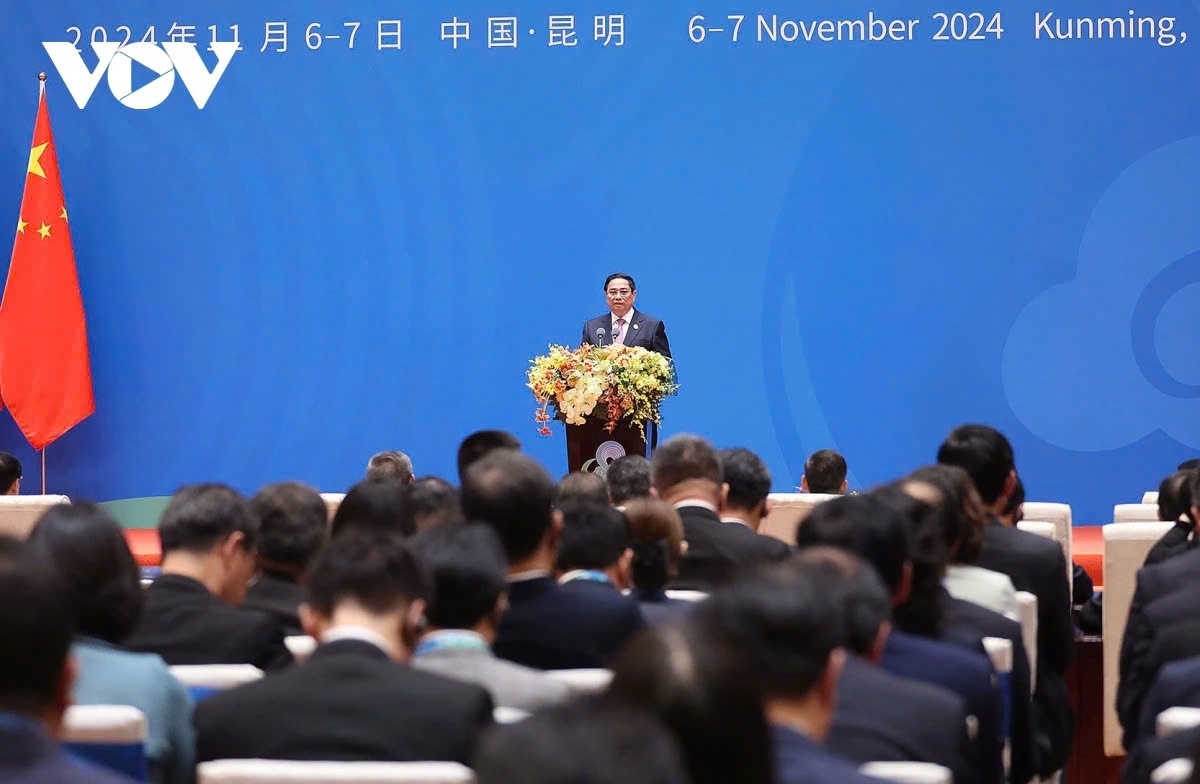
VOV.VN - Vietnamese Prime Minister Pham Minh Chinh underscored the need for the Greater Mekong Subregion to focus on developing new generation economic corridors, with innovation as the core, making it beyond the limits of traditional economic corridors, at the eighth GMS summit in Kunming, China, on November 7.

Addressing the function, Chinh affirmed the strategic role of the GMS in international integration and regional development, and at the same time emphasized several valuable lessons learned from the success of the GMS.
These lessons, according to the Vietnamese leaders, include providing equal and broad consultations to strengthen consensus for common benefits; building practical cooperation programs with a focus on people and communities; promoting economic connectivity and protecting the environment.
In his opinions, in the process of movement and development, the GMS must go ahead with innovation and creativity to both keep up with global trends and meet the specific development needs of the sub-region.
It is time for the GMS to focus on developing new generation economic corridors, with innovation at the core, transcending the limits of traditional economic corridors, he said.
The head of the Vietnamese government proposed three main components for the new generation economic corridors. Accordingly, there will be a corridor of technology and innovation, to help countries address institutional, policy, technological, and innovation gaps, as well as human and financial resource deficits.
He suggested promoting a growth corridor with both old and new driving forces, by expand investments in areas such as semiconductors, artificial intelligence, new materials, and clean energy, alongside focusing on infrastructure projects in transport, industry, and agriculture.
The region should also build digital platforms, expand digital markets, enhance digital skills, create tangible changes, and facilitate the flow of capital, goods, and services, he stated.
Chinh also suggested forming a green, sustainable, and inclusive corridor, with people at the center, saying the GMS should further strengthen cooperation on environmental programs, ecosystems, disaster management, and climate change response.
The GMS should also place particular importance on cooperation with the Mekong River Commission to manage and utilize the shared Mekong-Lancang river in an efficient, sustainable, fair, and rational manner, while collaborating in applying technology to integrated transboundary water management, he said.
The Vietnamese leader called on the GMS members to work together to address challenges, and affirmed that Vietnam will continue to closely cooperate with other member countries and development partners to build an innovative, dynamic, and sustainably prosperous region.
Themed “Towards a Better Community through Innovation-driven Development,” the summit discussed past cooperation, challenges and future directions for stronger economic cooperation and regional integration.
In his opening remarks, Chinese Premier Li Qiang emphasized that innovation is a key driver of economic growth, and affirmed that China is ready to share its achievements in innovation, enhance both hard and soft infrastructure connectivity, and strengthen subregional integration through policy alignment, standard harmonization, and people-to-people exchanges to facilitate travel.
The Greater Mekong Subregion Summit is an important conference aimed at strengthening economic cooperation and sustainable development in the region. Supported by the Asian Development Bank, the GMS mechanism initiated in 1992 brings together six countries, namely Cambodia, Laos, Myanmar, Thailand, Vietnam, and China (specifically the Yunnan and Guangxi provinces).
The objective of GMS is to promote economic growth, reduce poverty, and create development opportunities through cross-country cooperation in critical areas such as infrastructure, energy, trade, climate change response, and water resource management.
Vietnam joined the GMS initiative in 1992 as one of the founding members. It has since played a significant role in shaping the cooperation framework, which aims to enhance economic development, regional connectivity, and environmental sustainability across the Mekong region.
VOV.VN - Vietnamese Prime Minister Pham Minh Chinh joined leaders of Cambodia, Laos, Myanmar, Thailand and China, as well as the Asian Development Bank leadeship to attend the opening ceremony of the 8th Greater Mekong Subregion (GMS) Summit in Kunming, China, on November 7 morning.
VOV.VN - A Vietnamese delegation led by Deputy Minister of Natural Resources and Environment Le Cong Thanh recently attended the sixth Greater Mekong Subregion (GMS) Environment Ministers' Meeting (GMS-EMM-6) held in Phnom Penh in Cambodia.
Bình luận
Bình luận của bạn sẽ được xét duyệt trước khi đăng